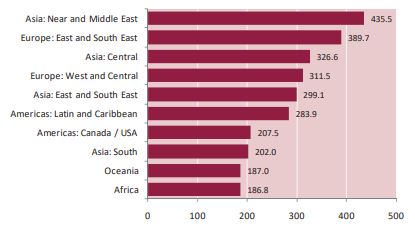One fundamental and often ignored view within economics is that humans have the propensity to display irrational behaviour in the decision-making processes.
Based on this notion, one can conclude that we have a fundamental tendency to act corruptly and be generally criminally-inclined except maybe the virtuous few.
How advanced our economy or society is, depends on what measures or incentives we enforce to deter or punish criminals.
In most cases, we find that in countries where punishment is severe (e.g. in Central Europe or Nigeria), the criminals end up moving to less strict countries.
The economics of crime, especially violent crime experienced in countries like South Africa and Brazil, is something that requires adept research if anything is to be done.
In the US, studies were conducted to access the impact of legalized abortion on the level of crime. This was discussed in detail in a best-selling book by Levitt and Dubner’s called Freakonomics.
The study found that legalizing abortion (seen by many as legalized killing equivalent to death sentences) reduces the level of drug abuse and subsequently other criminal activity.
The real problem
Perhaps there is no relevance here but for instance, abortion is legal in South Africa yet a high crime rate prevails. So, what’s the problem then?
Part of the problem lies in the fact that the incentives/benefits of committing crime far outweigh the “costs” and chances of being caught and convicted by the judiciary.

John Nash through his renowned works (well at least amongst economists), devised what he called “game theory” or “the prisoner’s dilemma”.
Cheating occurs through degrees of severity from a classroom test or examination all the way to the plotting and execution of murder or indirectly killing individuals by selling users addictive drugs.
Then you have your white-collar crime such as insider trading, corporate espionage (unlawfully acquiring recipes, formulas, and technologies from rival companies).
Or simply ‘cooking the books’ or siphoning off profits from a company’s coffers.
Nash’s rationale for such cheating behaviour boils down to the attitude of: ‘if I don’t, someone else will, and leave me with the short end of the stick – so given the option, I’ll always cheat’.
His explanation is one ‘formally proven’ reason for human ‘irrational’ behaviour – or rather, could we say it is rational if the outcome is to favour the decision-maker in the short or long term? This is instinct is innate in human behaviour of not such a few.
Crime and law enforcement
Back to the subject of crime: higher than usual levels has often been blamed on the poverty caused by poor and exclusionary fiscal, social and monetary policies.
There are of course more layers and underlying factors unique to the history of political climate and resource allocation.
Further studies (such as that in the Freakonomics book) need to be carried out such as the potential effects of police presence in deterring crime in the diagram below:
Police officers per 100,000 population by regions and sub-regions (medians)

Source: www.unodc.org
Also, highly recommended if you are a law enforcer, economist, government official, or student, is a book entitled Economics of Crime by Erling Eide, Paul H Rubin & Joanna M Shepherd.
This book covers the theory of public enforcement including probability and severity, fines and imprisonment, repeat offenders, incentives of enforcers, enforcement costs and enforcement errors.
It might shed some light as to how criminally-inclined people can be dealt with once and for all. Because as we know – whatever government is doing to fight crime now is clearly not really working!
“When crimes are left alone long enough to fester, a second economy is borne.”
The proceeds from a ‘secondary’ economy because of criminal activity never benefit society. Even though people like Pablo Escobar were seen by locals (in his Colombian town) as philanthropists, their assistance came at a price. Such contributions which are naturally tax-free generally are referred to in economics as ‘social ills‘.
A third market is formed – one comprised of the need to feel secure.
Dealing with the scourge
But fighting fire with fire (with more guns & police who are sometimes corrupt themselves) will not alone solve the problem.
Criminals simply become more aggressive when met with a more confrontational approach as seen in South Africa. The Jeppestown (Johannesburg) shoot-out in 2006 for example, left several police officers and criminals dead.
It’s time to get ’smarter’ about crime and look to the accuracy and conclusive study of human behaviour and the use of incentives.
As crimes continue to ravage communities, cities and countries, we can question why government officials have relatives who own or have stakes in security companies.
It basically places less of an ‘incentive’ for officials to do much about crime.
So, conceivably, those with such vested interests in the third economy would need to be weeded out of the system for crime to be curbed.

Leave a Reply